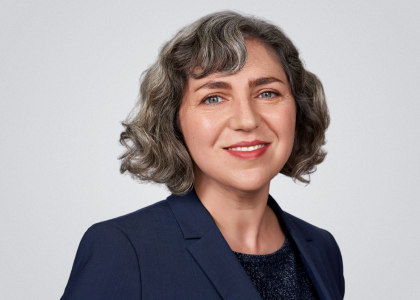Why one veteran LA Times reporter is trading her byline for a law degree

For nearly two decades, Emily Alpert Reyes ’28 helped tell other people's stories. She covered a range of topics, including city government scandals and health crises, often chronicling the challenges facing marginalized Angelenos for the Los Angeles Times. She won national awards for her education reporting and witnessed moments most people never see — shadowing a drug overdose rescue crew on Skid Row, covering an FBI raid of City Hall and documenting a mother's heartbreak as she placed her disabled son in institutional care.
“People trusted me with some of their hardest moments,” Reyes says. “They made me fall in love with Los Angeles.”
But reporting on injustice wasn't enough anymore.
Throughout her career covering city government and health care for the Times and education for the nonprofit news site Voice of San Diego, Reyes noticed a pattern: Meaningful change for marginalized communities often required legal action.
"I saw that it often took legal action to force powerful interests to change their practices, especially when it came to the rights of marginalized people," she says — an observation that became deeply personal once Reyes became the parent of a disabled child.
The rights her son enjoys today, like the right to remain in his community rather than being institutionalized and the right to access public spaces and services, exist because someone fought for them in court.
"Many basic rights for people with disabilities had to be fought for in court, and so much more remains to be done," Reyes says.
Now, as a first-year law student at UCLA School of Law, she's learning to see the world through an entirely different lens — not as a witness to injustice, but as someone who can fight it in court.
"I loved being a journalist, but after nearly two decades working as a reporter, I wanted to move into advocating for the causes that I care about," she says.
For her, this meant starting law school after two decades of professional journalism experience, which is proving to be an asset — not just for the journalistic skillset honed over years of reporting, but also for the mindset it cultivated.
"Journalism is a fantastic way to discover the many, many ways that you can be wrong," she says. "I think it is very helpful, psychologically, to come into law school already knowing that you can and will get things terribly wrong."
This comfort with uncertainty, with asking questions, being corrected and learning on the fly, has made the transition to law school smoother than she anticipated.
"I spent so much time panicking about whether I could manage law school that I wasn't prepared for how fun it would be to be a student," she says. "It's pretty magical to learn a new way of looking at the world in middle age."
The choice to attend UCLA Law for her legal education wasn't difficult for Reyes.
"So many of the attorneys who do public interest work that I admire in Los Angeles are UCLA Law graduates," she says. "This was always my first choice."
The law school’s robust public interest program is providing Reyes the tools to make that transition from observer to advocate.
Now, she has her sights set on becoming a disability rights attorney.
"My hope is that my past work as a journalist will help me explain the injustices facing disabled people in a compelling way for judges and juries — and that telling those stories in courtrooms can defend and advance the legal rights of people with disabilities."